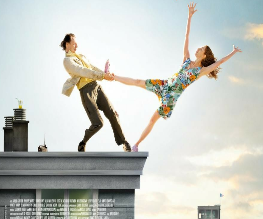The Fairy (La Fée)

L’amour! La vie! What fascinating and humane concepts! How they reach into our very souls and examine the sweet essence that dwells there! A concept that only becomes more powerful and true in French, don’t you think? And so we find Dom (Dominique Abel), working in a hotel in Le Havre, eking out his meaningless existence, until Fiona (Fiona Gordon), the titular fairy, arrives, granting him two wishes and then vanishing. Dom, now in love with the elusive minx, sets out to track her down, leaving mundanity behind him and looking to embrace a new and vibrant future. It’s actually a lovely concept, hinting at zephyrs of mysticism, and whiffs of the uncanny. A setting and story that marries dull, grey, monotonous harbour town life with a sense of magical escapism through the medium of love.
For a while, the film completely hooks you. A long and hypnotic opening shot sets mood, place and rhythm quite beautifully; the lights slapping off the rain on Dom’s poncho and the calming waves of the asphalt beneath his bike tyres instantly putting you on side with the whole thing. This is followed up with some well-paced and cunningly thought out slapstick that worthily elicits laughter. It’s warming, comforting and enjoyable. It’s a shame then that the appeal judders to a halt around here, and embarks into a voyage of monotonous humour, stretched metaphors and endless foot chases.
The tragedy of this film is that it seems like it knows exactly what it wants to be, but in its manifestation, shows its own cracks and weaknesses. For a film with such expansive and universal themes to explore, it comes across startlingly shallow and empty. Before too long, the physical comedy starts to wane; there are some fantastic moments, such as Dom and Fiona’s escape from a mental hospital, disguising themselves as one fat man with a beard, but these moments are too rare. There is instead an abundance of far less amusing moments, and in the end, rather than feeling fond of the kooky array of characters, they just end up being utterly and inexcusably annoying: the short sighted old man in the café, with his cack-handed, wall-pranging antics, doesn’t so much make you fall in love with him, as put an unquenchable need in your belly to take his tray from his shaking hands and beat him to death with it.
These are not the only impediments to the story. Pointless sub-plots are thrown in, tripping themselves up with inconsistencies that stem from misplaced jokes. An English tourist elicits a smile with his inability to grasp the French language, only to later on baffle as he repeatedly appears in subsequent scenes with no real role to play, but with a now incongruous fluency that serves only to weaken his character and make us question his presence in the film. He just doesn’t make any goddam sense.
But, these guys have their own brand of film-making, and there are certainly some aspects they really excel at. The dance sequences don’t feel off kilter, they are balanced, wonderfully kitsch, well choreographed and adeptly performed. The stringy, wiry leads give the film an individual aesthetic, and their real-life chemistry comes alive on screen. So it’s a mixed bag. The Fairy’s heart is in the right place, sure, the three wishes metaphor proves itself to be somewhat redundant by the end, but it provides some good laughs, and it puts across a clear message. It’s just a shame that it is buried beneath the repetitive comedy and layers of unnecessary and frankly uninteresting stories.
By Oliver Jones




Recent Comments